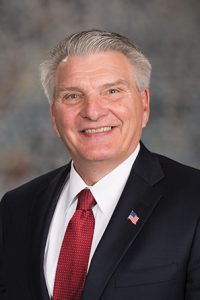Bill would direct pandemic relief funds to dual enrollment program
Community college programs that allow high school students to earn college credit would receive a share of the state’s federal pandemic relief dollars under a bill considered March 1 by the Appropriations Committee.

LB1087, sponsored by Gering Sen. John Stinner, would appropriate $15 million of the American Rescue Plan Act funds allocated to Nebraska to the state’s community colleges for dual enrollment programs. Funds would be distributed in $5 million per year increments over three fiscal years to community college areas in proportion to the number of students enrolled in dual credit courses.
Stinner said the dual enrollment program offsets tuition for dual credit courses, which he said provide students an easier transition into college and help them discover majors that suit their interests. When students are exposed to career opportunities, they are better prepared to enter trades and professions, he said.
“With the influx of federal funds to the state, we have a unique opportunity to make additional investments in workforce preparedness,” Stinner said.
Metropolitan Community College president Randy Schmailzl testified in support of the bill on behalf of the Nebraska Community College Association. Community college is an affordable alternative for many students, he said, but tuition still can be a barrier for low-income families.
Opening doors to all high school students through dual enrollment would provide a boost to students who have been negatively impacted by the pandemic by having their education interrupted, he said.
“This is really the opportunity to make a huge difference in the long run,” Schmailzl said. “We need to expose as many high school students as possible to discovery of college classes.”
Zach Pechacek also spoke in favor of LB1087, saying dual enrollment allowed him to become a master electrician at age 26 without any college debt. Pechacek, who now teaches at Metropolitan Community College, said he spent his senior year taking both high school and college courses. After high school graduation, he worked full-time as an apprentice and went to school in the evenings.
“Seeing this full circle, I can see what it can do for students and what a jumpstart it can give you,” he said.
Also testifying in support, Randy Gilson, Blair Community Schools superintendent, said the bill would allow students more dual enrollment options. The courses are important for students, he said, only 22 percent of whom are prepared to succeed in college when they graduate from high school, according to recent research.
“[Through dual enrollment] our students can learn highly advanced skills in welding, manufacturing, computer programming and nursing — not just to be an employee, but to be a highly skilled, sought-after employee,” Gilson said.
No one testified in opposition to the bill and the committee took no immediate action on it.

